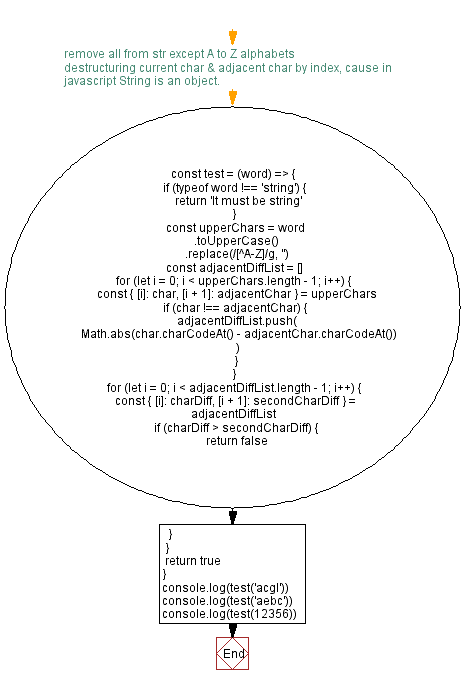JavaScript: Check exceeding word
JavaScript String: Exercise-52 with Solution
Exceeding Word Check
There is an increasing gap between two adjacent characters in exceeding words. In ASCII, the gap represents the distance between two characters.
Write a JavaScript program to determine if a given word is exceeding word or not.
Example:
'acgl'
Adjacent characters:
'ac' -> 2
'cg' -> 4
'gl' -> 5
So 'acgl' is exceeding word.
'aebc'
Adjacent characters:
'ae' -> 4
'eb' -> 3
'bc' -> 1
So 'aebc' is not an exceeding word.
Test Data:
'acgl' -> true
'aebc' -> false
Sample Solution:
JavaScript Code:
/**
* Source: shorturl.at/asFM4
* @function test
* @param {string} text
* @returns {boolean}
*/
const test = (word) => {
// Check if the input is a string
if (typeof word !== 'string') {
return 'It must be string';
}
// Convert the word to uppercase and remove non-alphabetic characters
const upperChars = word.toUpperCase().replace(/[^A-Z]/g, '');
// Initialize an array to store the differences between adjacent characters
const adjacentDiffList = [];
// Iterate through the characters of the word
for (let i = 0; i < upperChars.length - 1; i++) {
// Get the current character and the adjacent character
const { [i]: char, [i + 1]: adjacentChar } = upperChars;
// Calculate the difference in ASCII values between adjacent characters
if (char !== adjacentChar) {
adjacentDiffList.push(
Math.abs(char.charCodeAt() - adjacentChar.charCodeAt())
);
}
}
// Check if the adjacent differences are in non-decreasing order
for (let i = 0; i < adjacentDiffList.length - 1; i++) {
const { [i]: charDiff, [i + 1]: secondCharDiff } = adjacentDiffList;
// If the adjacent differences are not in non-decreasing order, return false
if (charDiff > secondCharDiff) {
return false;
}
}
// If all adjacent differences are in non-decreasing order, return true
return true;
};
// Test cases
console.log(test('acgl')); // Output: true
console.log(test('aebc')); // Output: false
console.log(test(12356)); // Output: "It must be string"
Output:
true false It must be a string.
Explanation:
In the exercise above,
- The function "test()" takes a single parameter 'word', which is expected to be a string.
- It first checks if the input 'word' is indeed a string. If not, it returns the message "It must be a string".
- The function then converts the input string to uppercase and removes all non-alphabetic characters using a regular expression.
- It iterates through the characters of the modified string and calculates the absolute differences in ASCII values between adjacent characters. These differences are stored in the 'adjacentDiffList' array.
- After calculating the differences, the function checks if the adjacent differences are in non-decreasing order. If any adjacent difference is greater than the next one, it returns 'false', indicating that the order is not non-decreasing.
- If all adjacent differences are in non-decreasing order, the function returns 'true', indicating that the condition is met.
Flowchart:

Live Demo:
See the Pen javascript-string-exercise-52 by w3resource (@w3resource) on CodePen.
For more Practice: Solve these Related Problems:
- Write a JavaScript function that determines if the gaps between adjacent characters in a word exceed a specific threshold.
- Write a JavaScript function that calculates ASCII differences between consecutive characters to test the "exceeding" property.
- Write a JavaScript function that accepts a string and a threshold value, returning true if the word is exceeding.
- Write a JavaScript function that validates the input and handles non-alphabetic characters in the exceeding word check.
Go to:
PREV : Boyer-Moore String Search.
NEXT : Check Flat Case.
Improve this sample solution and post your code through Disqus.
What is the difficulty level of this exercise?
Test your Programming skills with w3resource's quiz.
